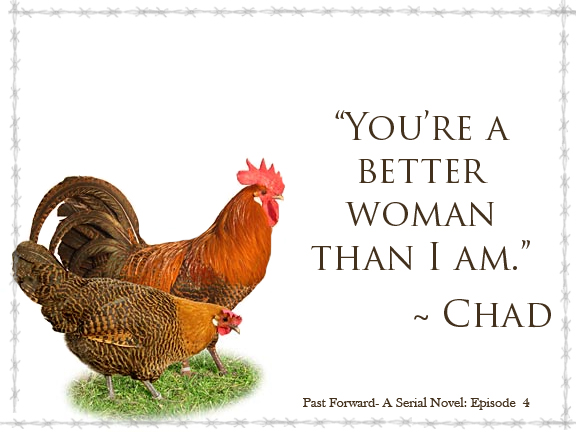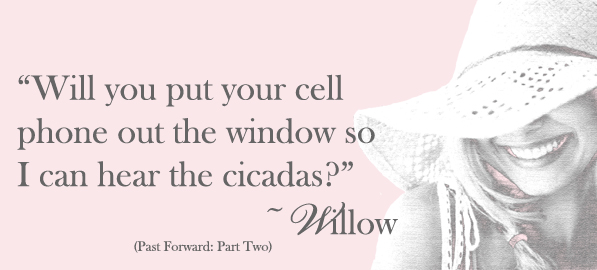Every day I get half a dozen emails about Willow asking questions, making observations, and begging for more. For those who have taken the time to encourage me, I really want to thank you! It’s so cool to open my email and see, “I want to BE Willow.” It assures me that I’ve accomplished my goal– making Willow as appealing and yet unique as possible.
Because of those questions, I’ve arranged this Willow interview–just a little conversation, or character interview, to answer some of the questions out there.
Links in this post may be affiliate links that provide me with a small commission at no extra expense to you.
What I Learned from this Willow Interview
Chautona: Thanks for taking time out of your busy schedule to talk to me.
Willow: Not at all. It’s the least that I could do.
Chautona: So why do you think people are so drawn to you?
Willow: I don’t know that it’s me–I think that people are drawn to a life lived with purpose and not decided by culture or society. They may not want it for themselves, but they enjoy escaping into a world different from their own.
Chautona: I disagree. I think you have qualities people admire. For example, you say what you think. It disconcerts people at times, but there’s something refreshing about knowing exactly what someone thinks rather than what they think you are comfortable hearing.
Willow: But isn’t that just an extension of my life? It’s how we lived. If Mother hadn’t encouraged me to be forthright, how would I be any different than anyone else? *chuckles*
Chautona: What amuses you?
Willow: I just remembered Chuck. People don’t like his forthrightness at all.
Chautona: Which proves my point exactly. So, have you found it difficult to adjust to “regular life?”
*interject a confused expression*
 Willow: Am I supposed to? I wasn’t trying to adjust to anything. This is just my life. I’m adding a few things to it, sure, but what most people consider “regular” isn’t my regular.
Willow: Am I supposed to? I wasn’t trying to adjust to anything. This is just my life. I’m adding a few things to it, sure, but what most people consider “regular” isn’t my regular.
Chautona: So things that are unfamiliar…
Willow: Some things will always be unfamiliar. Even if I’ve seen them before, how they are used or explained by people are different. Bill sees things differently than Chad does.
Chuck is almost from another planet, and then it’s as if women speak a different language and have different eyes than men. I’ve never experienced anything like that before. It’s hard to keep the nuances straight sometimes. *chuckles* I should probably admit that I don’t try very often.
Chautona: You don’t try what? To keep them straight?”
Willow: Right. I mean, sometimes I know what someone means, but it’s hard to articulate it if I’ve never discussed it before. Mother told me about a lot of things, and she probably told me about more than I know and less than she thought.
Chautona: I’m not sure I understand you.
 Willow: Well, take cars, for example. I knew about them. I knew they were much faster than walking. I’d seen them whiz by the farm, sometimes being chased by a police car. Mother considered them dangerous, so I didn’t give a lot of thought to them–just to knowing I was never, ever, ever to get in one.
Willow: Well, take cars, for example. I knew about them. I knew they were much faster than walking. I’d seen them whiz by the farm, sometimes being chased by a police car. Mother considered them dangerous, so I didn’t give a lot of thought to them–just to knowing I was never, ever, ever to get in one.
The first time I got in Chad’s cruiser, I was astounded at how fast things flew by. It was like being on the zip-line, but faster. Sure, I knew they went fifty-five miles per hour, and that at best, I walk about four. Thirteen times faster is one thing in your head. It’s another when you first get inside and experience it. It takes getting used to.
Chautona: Kind of like when I went to my first rock concert. I’d heard of people screaming and passing out, but I didn’t know until they set me in front of those person-high speakers that it was because it killed their ears and destroyed their equilibrium.
Willow: So that’s why you made me go to that movie with the camera spinning in circles!
Chautona: Hey, I needed some good return for that horrible experience. If it helps, you aren’t alone. My friend puked after the Keira Knightley Pride and Prejudice.
Willow: Is what you just said intelligible to you?
Chautona: Yes, why?
Willow: At least one of us understands you.
Touché
Chautona: Why did your mother choose not to have anything to do with the locals? Some people talked about her, but it doesn’t seem like they even knew where she lived. Chad said he thought that the reclusive woman he’d heard of (Kari) lived on the other side of the lake.
Willow: Well, Mother had been hurt. I mean, that’s obvious. I think she would have been open to being friendly with people if she wasn’t trying to protect me–
Chautona: Wait, what do you mean, “protect you?” Why did she think she had to do that?
Willow: The man gave her a check–paid her off. But he didn’t know about me. I’m proof of what his son did, though. If he knew, he might want to hurt me, so she wanted to be “gone.”
Chautona: And so she just ignored people?
Willow: It was more active than that. She made herself standoffish. She spoke as if she lived in the other direction. I think I remember walking the other way when I had to come with her as a child. I remember a highway, but that first morning– the trip into town–it was so much faster than I remembered. After I thought about it for a while, I realized that we never walked down the driveway. We walked along the river, around the lake, and came into town from the other side.
Chautona: But someone had to know where you lived–the feed and seed people for example. Maybe a mail carrier?
Willow: Yes, the Brant’s Corners feed people knew, but they didn’t know much. A few others… But Mother didn’t socialize. She kept to herself, ordered her things, and if it had to be delivered, she didn’t use Fairbury when we could help it. We’re five miles out of town in the opposite direction of most people. If you want people to leave you alone, if you rarely ever come into town, people forget you.
Chautona: I suppose. I’ve lived that a few times myself. No one in Mojave knew who we were and where we lived. My father appreciated his privacy much in the same way as Kari. I can see that.
Willow: I don’t think that would surprise anyone. People live in small neighborhoods without ever knowing the person next door. Why is it so strange that people wouldn’t know us when we’re rarely in town and don’t talk to people when we are–well, were. As soon as I started coming to town and interacted with people, they knew me, greeted me, and things were more…
Chautona: I believe the word is normal.
Willow: Well, more normal for others, I guess. It’s not normal for me. I’m still getting used to it. I like it in small spurts, but I get overwhelmed. I don’t know how people handle being inundated with people around them all the time.
That girl with all the kids–Aggie–I’d go crazy. I know I would. Sometimes Chad stopping in or even calling—oh, how I want to throw that phone away some days–is just enough to make me tell him never to come around again. I want to revert into Mother’s cocoon and stay there where I’m protected from being smothered by people.
Chautona: I suppose that some of it is stuff you just don’t care about, too. We tend not to pay attention to things that don’t interest us.
Willow: Exactly!
Chautona: Was it really so weird to use a phone for the first time?
Willow: Actually, it was. I mean, I’ve read books where people used them, but I never read anything about how small they are! It sounds so much simpler when you read about someone picking up a phone and dialing than to have to program numbers in and stuff like that.
Chautona: Well, you probably read about landlines rather than cell phones. House phones are bigger.
Willow: I also read about people saying “hello” when they picked up the phone, but I forgot about that. That happens a lot. Like I said, using that kind of information is very different than just reading about it.
Chautona: At least your mother educated you. I’m trying to write about a girl whose father kept her hidden all her life. Didn’t teach her anything. Nothing. Not how to read, how to write, how to do anything. She’s a virtual prisoner in an abandoned place. I keep trying to give her knowledge that she simply wouldn’t have.
Willow: Now that would be horrible. I’m grateful that Mother loved me. I love my life and I had almost twenty-three wonderful years with her. I can’t complain about that.
Chautona: But you want to.
Willow: Yes. I miss her. She filled in gaps for me. Things like how I could have so much money. I knew that man paid her a lot; I knew that money made interest, but until you hear Bill say, “You are a wealthy woman,” it doesn’t make sense. He keeps trying to make me “get it,” but I’m still having trouble with how much things cost. Why is Bill’s apartment more expensive than my farm? I don’t understand. I have space and the ability to grow and produce. He just has wood and steel in an ugly building.
Chautona: It’s all supply and demand. There isn’t a demand for farms but there’s a big one for apartments in a city and the city supplies are low, so the price goes up.
Willow: That makes sense to hear it, but when I see what I get for half what he paid for his little place, it doesn’t translate very well.
Chautona: I suppose that is right. What is the worst part of the changes in your new life? Aside from the loss of your mother, of course.
Willow: The cell phone. I don’t like being interrupted. People don’t understand why I don’t want to answer it when I’m doing something, but it makes me feel like a slave to someone else’s schedule. If I want to answer, I will. The only time I make myself answer when I don’t want to is for Chad. I do it because he’s convinced I’m going to kill myself out here someday and that he could have saved me if I had just had that stupid piece of plastic.
Chautona: Now there I totally get you. I don’t even carry a cell phone.
Willow: That’s it. I’m telling Chad that if my author doesn’t have to, neither do I.
Chautona: It won’t work. You’re keeping it. You won’t regret it.
Willow: We’ll see about that.
Chautona: Is there anything else you want to say about your story?
Willow: I guess I just want people to remember that their experiences aren’t the only ones out there. Mine are different–yours are. You made choices for my character based on how you’ve lived, what you’ve observed, and what suits my personality best. If it seems implausible, perhaps it is because, in the average (or even in most) American’s life, my entire existence is implausible, but [clickToTweet tweet=”…isn’t that what fiction is about? Making the implausible come to life and touching people with it?” quote=”isn’t that what fiction is about? Making the implausible come to life and touching people with it?”]
Then again, you lived five miles outside of a town the size of Fairbury and without electricity OR running water, in the DESERT, when you were in high school, so how implausible is it really?
Chautona: True. You know, I just thought of something else that reminds me of my childhood. Your mother was much like my father in how she created cool memories for you. My dad was a master of that. Kari did it much differently than Dad did, but the concepts… they are somewhat similar.
Chautona: Well, thank you for your time and I hope you’re pleased with how things get edited.
Willow: Oh, dear.
 Well, that’s it. My heart-to-heart with Willow.
Well, that’s it. My heart-to-heart with Willow.
Hope you enjoyed it. For your perusing pleasure, I’ve got the following for you:





